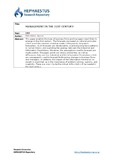| dc.contributor.author | Makridakis, Spyros | |
| dc.date.accessioned | 2015-12-08T10:02:56Z | |
| dc.date.available | 2015-12-08T10:02:56Z | |
| dc.date.issued | 1989 | |
| dc.identifier.issn | 0024-6301 | |
| dc.identifier.uri | http://hdl.handle.net/11728/6377 | |
| dc.description.abstract | This paper predicts the type of business firms and managers
most likely to emerge in the 21st century. The forecasts are
based on rational principles which avoid the common mistakes
made in the past by long-term forecasters. Such forecasts are
developed by examining long-term patterns in human history
and exploiting the analogy between the Industrial and
Information Revolutions. Moreover, the assumptions used to
forecast are made explicit. The paper points out strong
similarities, as well as differences, between the Industrial and
the Information Revolutions which are consequently used to
forecast forthcoming changes in business firms and managers.
In addition, the impact of the Information Revolution on
society is predicted, as is the importance of problem-solving,
learning, and creativity. These are shown to be the critical skills
which will be needed in the 21st century | en_UK |
| dc.language.iso | en | en_UK |
| dc.publisher | Elsevier | en_UK |
| dc.relation.ispartofseries | Long Range Planning;vol. 22, no. 2 | |
| dc.rights.uri | http://creativecommons.org/licenses/by-nc-nd/4.0/ | en_UK |
| dc.subject | Forecasts | en_UK |
| dc.subject | Metaforecasts | en_UK |
| dc.subject | Business Firms | en_UK |
| dc.subject | Business Managers | en_UK |
| dc.subject | Management | en_UK |
| dc.subject | 21st Century | en_UK |
| dc.title | Management in the 21st Century | en_UK |
| dc.type | Article | en_UK |
| dc.doi | 10.1016/0024-6301(89)90122-2 | |


